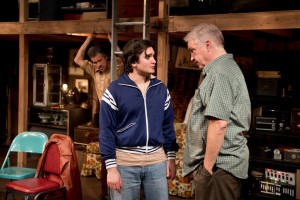 David Mamet’s American Buffalo is an assemblage of all things American: profanity, thievery, greed, the American Dream and toxic masculinity. Naturally, when it premiered in 1975, audiences were scandalized by the language, and many wondered at the point of the two-hour, testosterone-fueled descent into madness. Today, however, the play is regarded as an American classic about feelings of disenfranchisement among lower-class white men.
David Mamet’s American Buffalo is an assemblage of all things American: profanity, thievery, greed, the American Dream and toxic masculinity. Naturally, when it premiered in 1975, audiences were scandalized by the language, and many wondered at the point of the two-hour, testosterone-fueled descent into madness. Today, however, the play is regarded as an American classic about feelings of disenfranchisement among lower-class white men.
Directed by Tyler Dobrowsky, American Buffalo is the second play in the Sandra Feinstein-Gamm Theatre’s 32nd season. Incidentally, Pawtucket is no stranger to the story, as its film adaptation was filmed on location just blocks from The Gamm in 1996.
One glance at the set is all the audience needs to get the gist of what the show is about; something about empty beer bottles and poker chips strewn across a card table just reeks of masculinity. Around this is a wide array of junk as befits a junk shop; it’s a scene you might see in an I Spy book for all of its intricacy. It is a collection of the rejects of the world – both the items and the characters. The coming profanity is hinted at by a glowing sign to the audience’s left that proclaims, “All cell phones are f-ing prohibited.”
The pawn shop where the entirety of the action takes place belong to Don Dubrow (Fred Sullivan, Jr.). We learn that he is planning to steal back a buffalo nickel that he believes he sold to a customer for too little. He has enlisted his surrogate son Bobby (Marc Dante Mancini) to keep watch on the customer’s house and assist in the heist. Bobby reports that the man in question has left the house with a suitcase, making that night the perfect time for the burglary to transpire. Enter Teach (Tony Estrella), Don’s poker buddy, who soon learns of the plan and persuades Don that Bobby is too inexperienced and that he should take Bobby’s place.
The show has a small cast with only three performers, but they take up the entire space with their big personalities and the tensions between them. Teach is consumed by a paranoia that the world is against him, Don struggles to uphold his moral standards and Bobby just wants to please the man he looks up to. Their fears and passion erupt in moments of aggression and intense emotions. There are comedic moments, yes, but these are always underscored by the tragedy of these characters’ lives.
It is telling that Don and Teach refer to their impending crime as “business.” These are men for whom the promised American dream has fallen through. Business and crime to them are one and the same; both, after all, use exploitation to reach an end. The point of the robbery is not the wealth so much as it is the honor that they feel has been wrongly taken from them. Estrella’s Teach embodies all of the frustration of a man who feels betrayed by the world, from the moments when he is forced to admit he doesn’t know what he is saying to the moments when he is overcome by rage. His flighty mania is grounded by Sullivan’s steady but tired Don, who seems powerless to stand his ground next to Teach. Mancini’s Bobby, meanwhile, portrays a certain innocence and even when it is clear he has something to hide he is the easiest of the trio to sympathize with.
Other characters are alluded to, and other places are mentioned, but these are never seen, which creates a level of truth to Teach’s observation about the world beyond the shop that “There’s nothing out there.” Even from the audience’s perspective, there is nothing else, and we begin to see how men like them can focus so intently on what the world owes them that they fail to care about or empathize with the rest of the world – after all, they believe the world shows no compassion for them.
American Buffalo runs at The Sandra Feinstein Gamm Theatre through Dec. 18. For tickets, call the box office at 401-723-4266 or visit gammtheatre.org.


